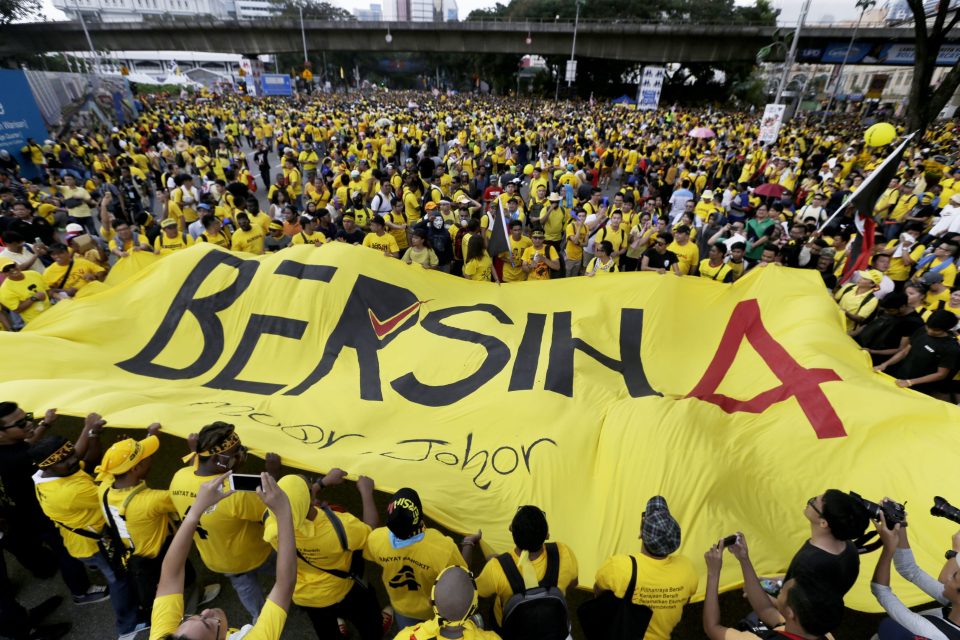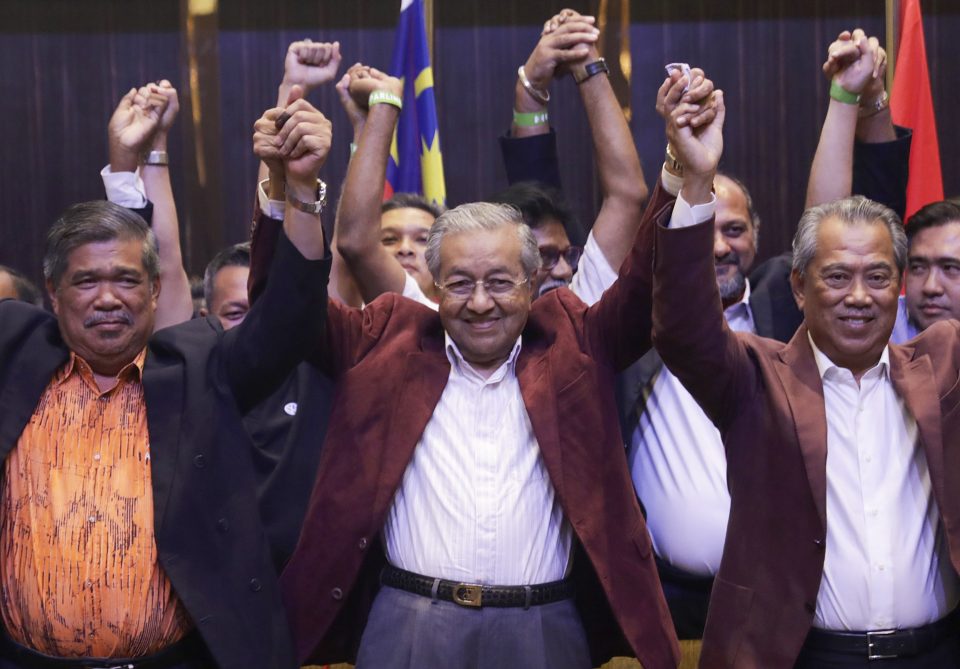More freedom and movements towards greater democracy in Malaysia
Asia Journalist Association (AJA), founded in 2004, is an international journalist association that operates under the motto of “One Line of Truth through Sweat and Blood” with the goal of fair reporting, protecting freedom of the press, and developing journalism. To commemorate its 20th anniversary, AJA is sharing special feature articles that look back on the association’s 20-year history and key events within the last 20 years in AJA member countries. THE AsiaN, an outlet based on the AJA network, is reporting 10 special articles marking the 20th anniversary of the founding of AJA every Tuesday and Friday starting April 15, 2025. – Editor’s note
Contributors for AJA Southeast Asia : Norila Daud (Malaysia), Sophal Chhay (Cambodia), Abdul Manan (Indonesia), Elitha Evinora (Indonesia)

KUALA LUMPUR: For the past 20 years, from 2004-2024, Malaysia has been going through several remarkable and challenging times towards building a more developed and greater democratic nation.
As a developing nation the people are consistently aspiring to get more freedom to speak, to hold public assemblies and to have more laws towards protecting human rights while enjoying the prosperity of the country fairly among the multi-racial and religious and diverse culture population.
Internal Security Act abolished
One of the draconian laws in Malaysia was the Internal Security Act (ISA) which had permitted indefinite detention without charge or trial of any official regarded as a threat to the national security such as suspected terrorists, or individuals allegedly promoting ethnic or religious divisiveness, or critical of the government.
However, the ISA1960 was abolished on 31 July 2012 and replaced by the SOSMA or Security Offences (Special Measures) Act 2012.
The Act was introduced by the sixth Prime Minister, Najib Tun Razak, and was approved in Parliament on 17 April 2012, given the Royal Assent on 18 June 2012 and Gazette on 22 June 2012 and came into force on 31 July 2012.
The Act provides special measures relating to security offences for the purpose of maintaining public order and security and for connected matters.

Bersih or Walk for democracy launched
The Bersih 2.0 rally, also called the Walk for Democracy, was organized by the Coalition for Clean and Fair Elections (Bersih) was supported by Pakatan Rakyat, the coalition of the three largest opposition parties, but was deemed “illegal” by the government.
Ambiga Sreenevasan, the former president of the Bar Council, chaired Bersih and the aim of the movement was to push the Election Commission of Malaysia (EC) to ensure free and fair elections.
Bersih’s supporters claimed that demands for electoral reform made during the 2007 demonstrations did not work and fell on deaf ears. The government-supporting parties, including the United Malay National Organization (UMNO) and Perkasa, planned counter-rallies dismissing Bersih’s demands for electoral reform. However, they called off the plan following its inability to secure a venue and the permit from the police.
Among others, it demanded the EC clean up the electoral roll, reform postal voting, use indelible ink, introduce a minimum 21-day campaign period, allow all parties free access to the media and put an end to electoral fraud.
The turnout at Bersih 2.0 held on 9 July 2011 was estimated between 10,000 and over 20,000. The protesters were unable to walk to the Merdeka Stadium as they had been forced to disperse by police who were heavily deployed throughout the city of Kuala Lumpur. Police arrested more than 1,600 protesters, including Ambiga and several opposition figures.
As reported by ISEAS Perspective 2021/167 on 21 December 2021, Bersih organized five massive rallies in Kuala Lumpur between November 2007 and November 2016. While Bersih failed to achieve its original goal to reform the electoral system, the movement made a significant impact on the Malaysian political milieu.
“The defeat of Barisan Nasional in the general election of 2018 brought hopes of far-reaching electoral reform, but those were dashed by the collapse of the Pakatan Harapan (PH) government in February 2020. Presently Bersih continues to campaign for electoral reform as a crucial basis of democratic politics.”
Provision of more human rights and media protection
Regarding the development of human rights, the Minister in the Prime Minister’s Department (Law and Institutional Reform) Azalina Othman Said said on 10 December 2024 that the role in promoting and protecting human rights undertaken by the government includes initiatives such as the National Action Plan on Business and Human Rights to expand excess to justice through legal aid, alternative dispute resolution and advance transparency with the development of Freedom of Information law.
According to Azalina, the promotion of human rights also covers strengthening the Human Rights Commission of Malaysia (SUHAKAM) through the amendments to the SUHAKAM Act 1999 (Act 597) and making Malaysia’s cyberspace safe.
“These initiatives demonstrate the government’s commitment to upholding human rights and fostering a more just society,” she said at the forum themed ‘Empowering our rights, securing our future: Business responsibility for people and nation’ in conjunction with Human Rights Day 2024.
Meanwhile, on the development of press freedom and media protection, the Deputy Communications Minister, Teo Nie Ching said the second reading of the Malaysian Media Council Bill in the Dewan Rakyat (Parliament) is expected in February 2025.
She said the bill tabled recently aimed at enhancing journalism standards and protecting the welfare of media practitioners.
“The bill reflects the government’s commitment to strengthening the media industry by supporting journalistic standards, promoting professionalism, developing an ethical reporting code and establishing an independent transparent complaints mechanism,” she said at the launch of the Malaysian Press Institute (MPI) training program titled “Artificial Intelligence: Empowering Journalists on Content and Newsroom Management” on 17 December 2024.
The minister stressed that the proposed Media Council would provide a platform for resolving media disputes while fostering public trust in responsible and accurate reporting.

GENERAL ELECTION 2018 : Barisan Nasional collapses after decades ruling Malaysia
An extraordinary and shocking case for the Malaysians in the 2018 General Election held on 9 May 2018 was when the Barisan Nasional (BN) or National Front coalition lost its grip on Parliament and control in almost all state governments in the 14th General Election (GE14).
It was reported that before the GE14, the youth group aged 21-40 had been playing important roles not just as voters but as political campaigners in various forms. Many of them were not registered as voters as they were not sure of which coalition to support.
It was also believed that the use of social media platforms such as Facebook and Instagram used by netizens had also helped influence the pattern of voting to shift from the BN coalition to the opposition coalition.
The BN consists of a coalition of nine parties including the United Malays National Organization (UMNO), Malaysian Chinese Association (MCA) and Malaysian Indian Congress (MIC) in Peninsular Malaysia. It was registered in 1974 and ruled the multi-racial and religious and diverse cultural background population until 2018. In 1994, the United Sabah People’s Party (PBRS) joined BN.
A new coalition – Pakatan Harapan or PH (Alliance of Hope) backed by the state-based Parti Warisan Sabah (Warisan, Sabah Heritage Party) replaced the BN.
PH was initially a coalition consisting of four political parties – Parti Keadilan Rakyat (PKR), Parti Pribumi Bersatu Malaysia (Bersatu), Parti Amanah Negara (Amanah) and Democratic Action party (DAP).
In the GE14, PKR garnered 104 seats, BN (79), PAS (18), DAP (9) Warisan (8), Bebas (3), Solidariti (1).
After the collapse of the BN government, the political situation in Malaysia underwent difficult times as within five years, there were three prime ministers from different coalition groups leading the country. This scenario made history in Malaysian politics since it gained its independence in 1957.
On 12 May 2018, former prime minister Najib Razak, who led the government from 2009-2018,announced that he stepped down as the President of UMNO and BN Coalition Chairman following the defeat in the 2018 general election.
The announcement of Najib’s resignation was attributed to the new government’s decision to bar him from leaving the country with his wife pending an investigation of alleged corruption cases.
The Pakatan Harapan (PH) chairperson Dr. Mahathir Mohamad,92, became the seventh prime minister on 10 May 2018 after he led the country as the fourth prime minister for 22 years from 1981 to 2003.
The government led by PH coalition collapsed on 24 February 2020 through commonly known as “Sheraton Move” when on that day Dr. Mahathir Mohamad resigned as prime minister.
The political crisis was believed to have started with divisions within the PH coalition. Some claimed that it began following prime minister Dr. Mahathir’s attempt to thwart the process of handing over power to his designated successor Anwar Ibrahim as promised ahead of his 2018 general election victory.
Subsequently the President of Parti Pribumi Bersatu Malaysia, Muhyiddin Yassin announced that 26 Members of Parliament (MPs) from the party withdrew from PH followed by the resignation of nine PKR MPs announced by the former deputy president Mohamed Azmin Ali.
Dr. Mahathir was appointed as the interim prime minister before Al-Sultan Abdullah Al-Mustafa Billah Shah (the King) named Muhyiddin as the eighth prime minister on 29 February 2020. Muhyiddin declared Perikatan National (PN) as the new government coalition although officially registered in August.
Following the changes within the coalition, the country was in the stage of political instability from 2020 until 2021 and the situation was compounded by the COVID-19 pandemic.
On 9 June 2021, the King met leaders of political parties after public anger against the government grew due to COVID-19 crisis as Malaysia imposed a nationwide lockdown in June.
On 13 August 2021, Muhyiddin acknowledged that he did not have the majority support. He urged opposition lawmakers to back him in a confidence vote in exchange of reforms and said an election will be held in July 2022 depending on the pandemic. However, the opposition parties and UMNO rejected the offer.
Muhyiddin and his cabinet resigned on 16 August 2021 after staying in power for 17 months. UMNO leader Ismail Sabri Yaakob was appointed as the ninth prime minister replacing Muhyiddin.
Ismail Yaakob was appointed as prime minister on 21 August 2021 by the King after he received a majority support from the MPs.
To create a greater political stability, the government under Ismail Sabri signed a Memorandum of Understanding (MoU) with the PH. However political instability occurred in the state legislative assemblies in Melaka and Johor and triggered further elections.
The 15th general election was held on 19 November 2022 following the political crisis that resulted in a hung Parliament. A hung Parliament is when no political party has enough seats to secure an overall majority to form the new federal government. Anwar Ibrahim was later appointed to lead the coalition government.
PH had won 82 seats and Perikatan Nasional (PN) 73 seats as of 4.30 am when the Election Commission declared the results for 219 of the 222 seats in the Dewan Rakyat (Parliament).
However, EC chairman, Tan Sri Abdul Ghani Salleh in a press conference at 5 am said no party had secured a majority of 50 per cent of the 219 seats declared.
Meanwhile, BN won 30 seats, down from the 79 it won in the 2018 general election.
Both the caretaker prime minister Ismail Sabri Yaakob and UMNO President and BN chairman Dr. Ahmad Zahid Hamidi retained their seats.
Under Prime Minister Anwar Ibrahim, the government is known as MADANI or Unity government.
The government now controls a two-third parliamentary majority. The government comprises four coalitions: Anwar’s Alliance of Hope (Pakatan Harapan-PH), the once dominant National Front (Barisan Nasional-BN), Sarawak Parties Alliance (Gabungan Parti Sarawak-GPS) and Sabah People’s Alliance (Gabungan Rakyat Sabah-GPS) and they have respectively four, four, four and three parties in the Federal Parliament.
The coalition also has three standalone parties, Heritage Party (Parti Warisan-Warisan) and two regional parties.
Recently, the Unity Government has pledged that it will continue working hard in years to come to stimulate a more prosperous future for Malaysia.
The prime minister in a Facebook post on 22 December 2024 said that the MADANI government has implemented various plans to continue boosting the nation’s economy throughout this year to ensure lasting prosperity for the people and the country.
The post entitled: 2024 Highlights: “Increase economy, abundance prosperity” cited that the investment in digital economy amounting RM254.7 billion had been approved (Jan.-Sept.2024) and had created 159,000 jobs.
“The investors in the digital economy include Microsoft, YTL Nvidia, Oracle, Amazon Web Services and Google,” said the post.
The post also highlighted the progress of the New Industrial Master Plan 2030 (NIMP 2030) this year coinciding with Malaysia’s Q2 GDP growth of 4.7 per cent (RM4.2 billion).
“In addition, the median wage increased by 8.2 per cent (RM201), training of 1,057 technical experts, jobs increased to 0.9 per cent and creating 200,000 jobs with RM34.6 billion investments in semiconductor,” said the post.
Meanwhile in his Facebook post on 30 December 2024, Anwar Ibrahim said that Malaysia is seen to be a strategic partner and has been recognized by superpower nations for its role in fighting global issues that includes helping the people of Palestine to get justice and fight for a fairer and balanced world order.
Anwar stressed that Malaysia is ready to take the responsibility of pioneering the rise of ASEAN (Malaysia is Chairman of ASEAN 2025) and bringing the region to a new era that is more inclusive and sustainable.
“With strong support from the international community, we will move more confidently into a new year and to spur the prosperity together,” he said.
COVID-19 PANDEMIC : Visit Malaysia Year 2020 affected
KUALA LUMPUR: Malaysia was hit by COVID-19 pandemic and, for the first time, the people had to go through the national lockdown introduced in March 2020.
The Movement Control Order (MCO) was subsequently introduced as the country continued to fight against the spread of COVID-19.
Following the restrictions of movements imposed by the government, economic sectors such as retail, aviation and tourism had suffered for 12 months. This situation was contrary to the positive expectations of the Visit Malaysia Year in January 2020.
Due to the COVID-19 pandemic, some businesses were closed for good, leading to the increase in unemployment with 748,200 persons jobless as of October.
The first Malaysian tested positive for corona virus was a 41-year-old man who travelled to Singapore on January 16-23 for a meeting that brought together international delegations, including from China. The case was detected on Feb.5.
The COVID-19 cases spread at a lower rate until a case was detected in Brunei Darussalam. The case was originated from a tabligh gathering at Sri Petaling Mosque in Selangor in March. The Sri Petaling cluster infected 3,375 people, including 2,550 Malaysians.
The COVID-19 cases increased and as of 24 December, there were 468 clusters in the country, the highest being from a glove factory-linked cluster “Teratai” that detected 6,003 positive cases. According to the digital data from KKMNOW dated 8 December 2024, the fatalities due to COVID-19 were 37,351, including 7,943 brought in dead (BID) and 5,278,911 recovered.
(To be continued)
Related Articles : Asia Journalist Association 20th anniversary special feature articles – THE AsiaN
AJA born of a meeting of minds – THE AsiaN
AJA and My Seven Sojourns in Korea – THE AsiaN
“A bridge connecting Asia and the world, AJA’s journey is ongoing” – THE AsiaN
AJA: An Open Community Beyond Borders and Cultures – THE AsiaN
More freedom and movements towards greater democracy in Malaysia – THE AsiaN
Cambodia Hosts First-Ever Regional Games in History – THE AsiaN
The rise and fall of fighting corruption in Indonesia – THE AsiaN
Political instability brought about by the first political revolution – THE AsiaN
Uzbek President delivers historic speech in native language at the 2023 UN General Assembly – THE AsiaN
Georgia in its existential struggles for the last twenty years – THE AsiaN




